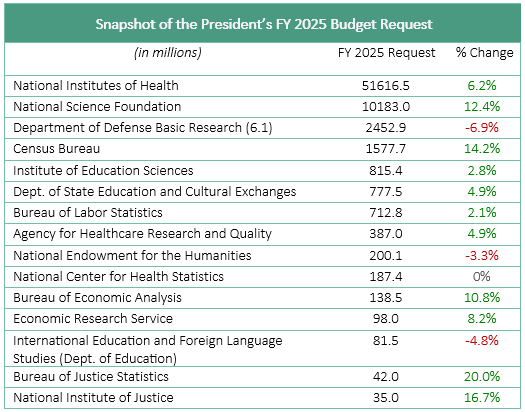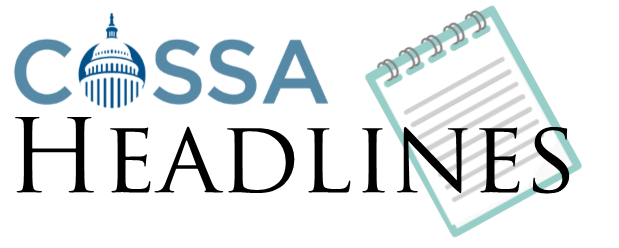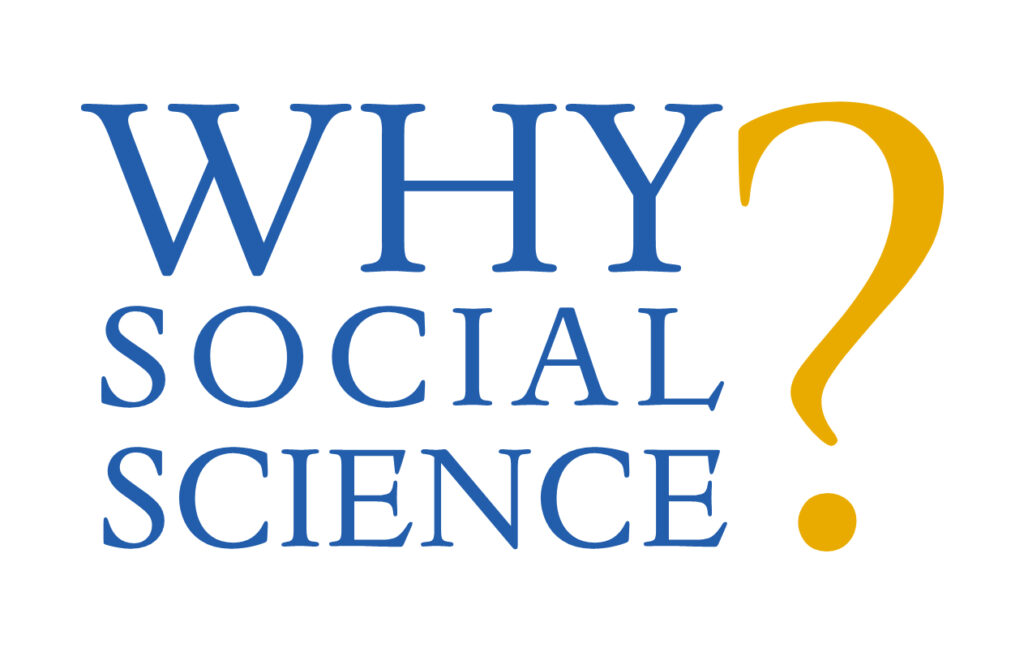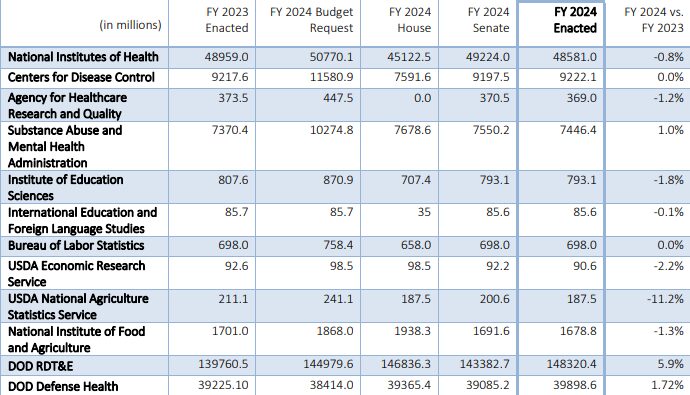Issue 7 (April 2)
COSSA’s Analysis of the President’s FY 2025 Budget Request for Social and Behavioral Science
On March 11, the Biden Administration transmitted its fiscal year (FY) 2025 budget request to Congress.
The FY 2025 budget was released while Congress was still working to finalize its annual appropriations bills for FY 2024 (the fiscal year that began October 1, 2023). The FY 2024 appropriations process was completed on March 22 with the passage of a second omnibus package (see related article). The first package was passed on March 8.
As COSSA has been reporting over the last several months, the FY 2024 appropriations bills were bound by strict budget caps that were agreed to in January (although the same deal was floated much earlier in 2023). These caps, unfortunately, have resulted in reductions to many accounts, returning some agency budgets back to FY 2023 levels or below. Some of these cuts were quite sizeable (e.g., National Science Foundation), making some of the increases proposed in the Administration’s FY 2025 budget appear larger than originally intended. In many cases, the FY 2025 request, if appropriated, would restore agency budgets to their FY 2023 levels with small increases on top of that.
It is important to note that the budget deal struck earlier this year also includes spending caps for FY 2025, leaving little room for increases next year. As such, the Biden Administration’s budget request for FY 2025 includes much more modest proposals for federal science agencies, especially when compared to previous budgets when caps were not on the table.

COSSA will continue to report on the progress of FY 2025 funding legislation in the weeks and months ahead. In the meantime, we invite you to read our analysis to learn about the President’s proposals as they pertain to social and behavioral science research.
Advocacy Day Spotlight: Last Chance to Register!

Next week is COSSA’s tenth annual Social Science Advocacy Day! This is your last chance to register before we close the form. Register here!
Social Science Advocacy Day will be taking place April 8-9, 2024 in Washington, DC and is open to anyone affiliated with a COSSA member organization or university. Not a member? Learn how here.
Visit the COSSA website for the latest information on Social Science Advocacy Day.
REGISTER NOW: Headlines Webinars continue April 23

COSSA’s 2024 Headlines Webinar series will continue to feature discussions with leaders of federal science agencies, providing opportunities for the social and behavioral science community to learn about agency research programs, funding opportunities, and priorities.
Upcoming Webinars:
- April 23 will feature a discussion with Dr. Jane M. Simoni about the behavioral and social science priorities at the National Institutes of Health. RSVP here.
- May 22 will feature a discussion with the Director of the U.S. Census Bureau, Robert. L. Santos. RSVP link and more details to come.
Did you miss March’s webinar? You can watch the recording now to catch up on our discussion about the research and education programs and priorities of the STEM Education Directorate at the National Science Foundation with Dr. James L. Moore III.
Headlines is a webinar series available to COSSA member organizations.
Carlotta Arthur and Emanuel Robinson from NASEM Answer “Why Social Science?”

The most recent Why Social Science? post comes from Carlotta Arthur and Emanuel Robinson from the National Academies of Sciences, Engineering, and Medicine (NASEM) who discuss how the social and behavioral sciences are poised to inform and improve AI and AI systems.
Read on for more.
President Biden Signs Final Round of FY 2024 Appropriations Bills
With little time to spare, Congressional appropriators came to final agreement on fiscal year (FY) 2024 funding for the remaining six appropriations bills. As recently reported, Congress passed and President Biden signed into law a package containing six of twelve annual appropriations bills, including the bill that funds the National Science Foundation, Census Bureau, National Institute of Justice, and Bureau of Justice Statistics, among other agencies and departments. The latest package was announced this week and contains the following FY 2024 bills: Labor, Health and Human Services, Education; Defense; Financial Services; Legislative Branch; Homeland Security; and State and Foreign Operations.
Of particular interest to the COSSA community is the Labor, Health and Human Services, Education, and Related Agencies (LHHS) appropriations bill, which funds the National Institutes of Health and other health agencies, the Department of Education, and the Department of Labor. The following pages detail the final appropriations levels for these agencies included in the FY 2024 LHHS bill.
As previously reported, the FY 2024 appropriations bills are bound by the strict budget caps agreed to last year. As with the other FY 2024 package passed earlier this month, these caps have resulted in reductions to many accounts, returning some agency budgets back to FY 2023 levels or below.

In addition to the cuts made to several agencies, the lateness of the final budget puts extra strain on science agencies that need to obligate their funding by the end of the fiscal year on September 30. Agencies’ employees will work feverishly over the coming weeks to develop their spending plans, which will detail how each plan to address reductions in funding. These plans are due to Congress but not public.
With FY 2024 behind us, Congress will now turn its attention to the FY 2025 appropriations process.
Read on for details of the FY 2024 final appropriations for the Department of Health and Human Services, including the National Institutes of Health, Department of Education, Department of Labor, Department of Agriculture, and Department of Defense.
The bill text and accompanying reports are available on the House Appropriations Committee website.
Stay tuned to COSSA’s reporting to get all the details about FY 2024 and FY 2025 science funding.
Rep. Granger Stepping Down Early from Appropriations Chair
Earlier this year, Representative Kay Granger (R-TX) announced that she would not be seeking reelection in November for the House of Representatives. Representative Granger was elected to the House of Representatives in 1996 and was elected to her leadership role on the Appropriations Committee in 2018 (see previous COSSA coverage). On March 22, Representative Granger announced her intent to step down as Chair of the House Appropriations committee early and requested the GOP, the current majority in the House, elect a new Chair to finish out the 118th Congress. With the budget for fiscal year (FY) 2024 completed (see COSSA’s analysis of the final bills), Representative Granger has expressed that, with her retirement approaching, a different member should take the mantel to see the FY 2025 budget process through from start to finish.
Representative Tom Cole (R-OK), currently the Chair of the Transportation-HUD subcommittee, is the only current member of the House that has announced intention to run for the position. However, Representative Robert Aderholt (R-AL) is another potential candidate, having seniority over Representative Cole and currently serving as the Chair of the Labor-HHS subcommittee. If a Chair of one of the subcommittees is elected to the position, there may be a shake up in the subcommittee leadership roles in the months leading up to the November elections unless a waiver is granted to allow the Chair to keep their subcommittee assignments.
Stay tuned for COSSA’s continued coverage on this story.
President Biden Issues Executive Order to Advance Women’s Health Research
On March 18, President Joe Biden issued an Executive Order, titled “Advancing Women’s Health Research and Innovation.” This order directs specific advancements and improvements for research on women’s health, largely through the White House Initiative on Women’s Health Research, established by the Presidential Memorandum of November 13, 2023.
The Initiative draws on interdisciplinary backgrounds to advance research on the prevention, diagnosis, and treatment of conditions that affect women uniquely, disproportionately, or differently. This order now names the following topics of interest: women’s midlife health, addressing current gaps in research, and integrating women’s health research into federal research programs. These directions align with the President’s priorities to reduce health disparities, to translate research into real-life applications, and to ensure access to high-quality, evidence-based health care. The Executive Order coincided with many announcements made by federal agencies to promote women’s health research.
The Executive Order was published in the Federal Register on March 21.
New JASON Report Advocates for Project-by-Project Approach to Sensitive Research Security
The National Science Foundation (NSF) has commissioned a new report from JASON, an independent scientific advisory group, on the implications of imposing broad controls on sensitive research security. The report reaffirms a longstanding policy that fundamental research should remain largely unrestricted unless specific sensitivities require classification. JASON suggests the need for updated research security measures in ways that do not stifle innovation and openness.
The report evaluates international collaborations, especially highlighting concerns with the Chinese government’s approach to fundamental research for military needs and restrictions on information flow. The report recommends a nuanced method where the NSF collaborates with Principal Investigators and their institutions to customize security protocols for projects deemed sensitive, prior to peer review. This recommendation seeks to preserve the essential openness of scientific research while ensuring national security.
NSF intends to review and implement these recommendations by a May 24 deadline.
NCSES Requests Responses to Data Tools Survey
The National Center for Science and Engineering Statistics (NCSES), housed within the National Science Foundation (NSF), is requesting responses to a new survey intended to improve NCSES data tools.
As previously reported by COSSA, NCSES has been working to expand accessibility to their collected data through developing new resources, including the Knowledge Base, in an effort to modernize their data tools.
Responses to this survey are confidential and would be used to improve these efforts. Submit comments and feedback here.
OMB Publishes Revisions to Race and Ethnicity Standards for Federal Data Collection
On March 28, the White House Office of Management and Budget (OMB) released the updated standards for Statistical Policy Direction No. 15: Standards for Maintaining, Collecting, and Presenting Federal Data on Race and Ethnicity. The revisions come after months of seeking comments from the public, including through requests for public comments, public listening sessions, and town hall meetings on the topic.
Effective immediately, based on the recommendations of the Federal Interagency Technical Working Group on Race and Ethnicity Standards, a Middle Eastern or North African (MENA) minimum category will be separated from the White category, a decision that has been widely requested by the community (see previous COSSA coverage).
Further, OMB has accepted the single combined question recommendation from the working group, allowing respondents to select multiple race and/or ethnicity options as needed. Additional changes include requiring all federal agencies to adopt the new standards when collecting data, updating terminology, and the development of implementation guidance.
The working group also identified topics for further research, including how to maximize the comparability between Federal Agency data collection and how to encourage respondents to select multiple entries for race and/or ethnicity categories. For more information on the new standards, OMB published a summary of the changes here.
Remembering Dr. Daniel Kahneman: A Pioneer of Behavioral Economics
The social and behavioral science community lost a giant with the passing of Dr. Daniel Kahneman on March 27 at the age of 90. Kahneman, known as the “grandfather of behavioral economics,” leaves behind a legacy that has fundamentally shaped our understanding of human decision-making, risk, and cognitive biases.
Throughout his career, Kahneman’s research was heavily supported by the National Science Foundation (NSF), receiving three significant grants that propelled his work on cumulative decision-making. His projects, such as “Understanding Loss Aversion,” “Analysis of Retrospective Utility,” and “Decision Under Uncertainty,” have paved the way for new insights in the fields of economics, psychology, and beyond.
Kahneman’s most notable accolade, the 2002 Nobel Prize in Economics, was awarded for integrating psychological research into economic science concerning human judgment and decision-making under uncertainty.

